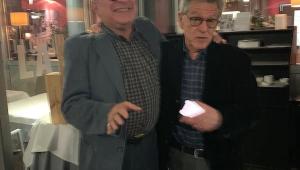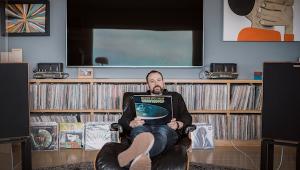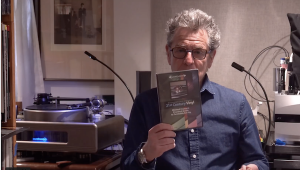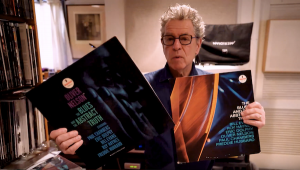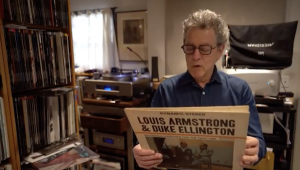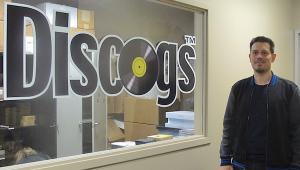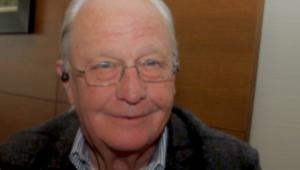Bonnie "Prince" Billy Grants a Rare Interview--Pt. 2

WO: Yes. I mean even in Nashville when Mark and I did tours of studios for this new record thinking where we were going to record, the studios were dead because everybody has their home studios now.
MF: And theyre mostly bad.
WO: Right, right.
Part Two picks up with a discussion of the disappearance of commercial recording studios, the recording of Sings Greatest Palace Music, and the life and times of an "indie" recording artist--MF
WO: Yes. I mean even in Nashville when Mark and I did tours of studios for this new record thinking where we were going to record, the studios were dead because everybody has their home studios now.
MF: And theyre mostly bad.
WO: Right, right.
MF: They dont know what theyre doing. All these people have their own studios and the great records that used to be made by professionals, guys who knew, and big rooms, thats going away. Thats why those old records are priceless. Cant compete with those old records. Although that (Viva) is an amazing sounding record.
WO: Yes, their studio was great and I think we did sort of three sessions each December for three years in a row, made a record with Steve then, and its hilarious and fun working with Steve.
MF: With the core guys that you usually work with.
WO: Yes, it was always like a variety. My older brother plays on it and then acquaintances that I knew, like an acquaintance plays drums, and one of my best friends plays guitar and then a musician that I admired from Chicago plays all the different keyboard things, Mellotron and organ and piano.
MF: Who takes care of the business end of all this, do you have someone who does that for you? Is it getting more complicated as it becomes less of a family thing and more of a I mean it has to happen at some point.
WO: It depends. Theres live business and record business, and I try to not do something thats going to require more business --
MF: It gets complicated. You come in and play that, you come in and play that and it gets more complicated. People want to get paid.
WO: Yes, exactly, and the way we used to do it was, because Drag City was a profit split record company where they do fifty-fifty profit splits with the artist.
MF: Oh, is that right? I didnt know that. Everybody Ive ever dealt with there has really been nice.
WO: Yes, theyre really great.
MF: But are they really equipped to handle this record?
WO: Thats what were seeing. Were seeing whats happening. I call there and ask hows it going and theyre going its going really good. Theyre like really excited but its more work than theyve done in the past so its cool. And for this record I used to say like okay, heres the cut, so they would pay quarterly and I would say Ned gets this percent, Brian Rich gets this percent, the drummer gets this percent, and thats how it used to work until after five or six years the quarterly statements were like they were paying 40, 43 people just on my records alone. So then I was like did it pay off finally because the books were getting too complicated to pay off, and now I try to pay everybody right after they do their job, basically. And once we mix a song Ill send them a mix of however many songs theyve played on and a check for the songs they played on. It was cool doing this last record because I got an idea of what professional musicians make so then I just paid everybody the same thing that the session guys made per song.
MF: So youre a reluctant entrepreneur in that sense.
WO: Yes, but I do try to do that also as immediately as possible so that then the next day I can forget about it. I try to stay as ignorant as possible about as many things as possible while knowing that theyre getting taken care of, though.
MF: And the tour thing is a whole different thing. Now, are you touring to support this record?
WO: I just tour a few times a year and it doesnt matter whats going on on the record side.
MF: Youre not like playing the game? Now, this whole interview thing, whose idea was that?
WO: It was a combined thing like having spent sort of more time and money on this record than before and feeling as if also, all along the way working with Drag City I never really talked about this before, but we do its important to both sides that the other side is as strong as possible. And like with that record, up until that point, the label Touch and Go, also out of Chicago, Drag City, and Touch and Go still manufactures and distributes some Drag City titles. At the time they were doing all of Drag Citys full-length titles, Touch and Go was manufacturing and distributing. Touch and Go also has a fifty-fifty split with their artists, but with the labels that theyre manufacturing and distributing they pay the way it was working out was that Drag City was paying the artist 50 percent but they were only making 30 percent because they had to pay Touch and Go 20 percent. And I was like well thats okay but how is Drag City going to become a better record label if theyre not making as much money as possible. So this was the first record where I was like what if you manufactured and distributed this full-length record? So we figured that this was going to do well because the previous two records had done well and I knew that this record sounded good, so at the same time we were losing some potential for an audience to hear it because we were having to open up brand new distribution channels, but at the same time the rewards were better and Drag City could become stronger --
MF: How did it work out?
WO: It worked out, over time, like you think like this is going to be the great thing right now and all of the results dont come in right then, they come in a year later, two years later, five years later.
MF: Right. Its always been an investmentj
WO: And so its the same thing right now, theres an amazing staff and Drag City and this record is something that lots of people could hear, could enjoy ideally, and why not -- I dont like to do press but why not flex the muscles of Drag City right now and theyre excited about it lets work this record. And that way if we want to do something in the future we have the chance to do it because weve established you know.
MF: Thats true. And how has the response been in New York, are you like booked up?
WO: Yes. I mean today its ten A.M. to nine P.M.
MF: Wow! Ugh.
WO: Its insane. And I told her, I was just like Im doing this and so I was like book it, book it solid because I dont want to stretch it out, I want to just get it done. Just do it, do it, and Ill try to build Ill just try to work momentum.
MF: A record like this gives people a lot more to talk about because it is a break on a certain level from what youve done, and its very accessible, and I think a lot of journalists, its the kind of record journalists can get behind without making any kind of apologies, Well, you might not you know, its all of those things. So Im sure people are coming in and theyre very enthused about it. Because I was enthused about this record (Viva). Its not for everybody and you have to give it a chance and
WO: And its funny because like when we made that record I totally thought it was for everybody.
MF: Well, I think it is.
WO: On some level it is but I know like I think I heard the other day someone from Australia wanted to use the song New Partner in their movie and so they sent me a clip of the scene that they wanted to use it in and I was watching it and I was just like, that song sounds rough, you know, like thats coming off listening to this new version that we got, but at the time I was like that is one of the most polished pop gems Ive ever heard in my fuckin life.
MF: And it is pop. It is a polished pop gem and the simple clarity of it, thats what amazed me, the clarity and everything and just every part was right out front and you couldnt hide anything in that. Well, the thing about Drag City is when I first read this I mean Rian (Murphy) sends me a letter and I had a magazine at that point in time and now its all online and this is the magazine that I published (The Tracking Angle). Ill give you that. My review of that record is in there.
WO: Cool. Excellent.
MF: One of the things I was going to do is if this wasnt going well Id say, all right, youre an artist, you play in front of people, Ill sit here and Ill read you my review. I wont do that. Its in there. But that was really great because I think what had happened is he had bought the magazine at a Borders or something. It was small distribution. And he liked it and he contacted me, and, you know, that doesnt happen. You have to and it worked out great because --
WO: Yeah, I mean thats like every time that we like every few records we decided we wanted to do press and thats what we do. Like, I go out to the record stores and the book stores and look at the magazine racks to see whats a new magazine or what I havent seen before and think like oh thats cool. Usually Ill be like send it to this and theyll be like what is that? Ill be like just send it to them please. Well do that and theyll be like, okay, how about Spin? Ill be like no, dont send it to them, dont send it to Rolling Stone, dont send it to Spin.
MF: Are they going to cover this record?
WO: I dont give a shit. Honestly, I think there are so many better music magazines than those. If theyre going to cover it then they can buy a copy.
MF: And they can.
WO: Yes, they can. And if they dont buy a copy then thats all the better for the whole world I think.
MF: [LAUGHTER] Well, I wont disagree with that. ;Who insists on the vinyl coming out, is that your are you into that or is that Drag Citys thing?
WO: Im into it to some extent. At the same time, like the record after that was the first record where I started thinking like that its more important to think of the song you know, in sequencing a record its more important to think of the songs as first song to last song rather than first song to a side, break, side, break on it, which is how I thought of it up until and including this record for sure. And now I think like that thats sort of important but I know that you have to make it for most of the listeners.
MF: Yes, theres a couple of thousand people buying the vinyl, but they really care, they really care.
WO: And, you know, like you were saying about studios, I think its tricky with vinyl. People buy the heavy vinyl and I think thats I dont trust that because I dont for a variety reasons, one is because I own RCA records from 1973 where they were making things as thin as possible, the Dynaflex?
MF: Thats terrible. Its horrible.
WO: But also knowing that and having bought some of these thick reissues of old records, just to get people to buy, I think, because I dont think that theres all the really great people who are in mastering, in order to make a living have moved on to mastering for CD. I would say there are 100 mastering engineers and they have to make a living.
MF: But Bernie Grundman is one of the best in LA. He cuts lacquers and he cuts CDs. The older guys that are really like Denny Purcell, he died unfortunately, was one of the best guys at Georgetown Masters.
WO: Also I would like it, if you had the chance, if you would make a list of some of these people because theres a limited pool that people in independent music, you know, they --
MF: John Golden, hes great. Hes good.
WO: I like John Golden sometimes but there are certain things I notice hes specific, also. Hes sort of an artist.
MF: Hes got a house sound and he can turn your music into his sound?
WO: I know that like he has the same criticism all the time like why didnt you use theres too much sibilance on this. Hes always said that and its like, well, we totally de-essed the fuck out of it knowing that you would say that. And I do feel like that he has a clientele and everything is fine.
MF: He might not be the right person to do your records.
WO: Thats what I think.
MF: But I can turn you on to all the guys that are doing this. This is my thing. And each guy has their own set of principles and sounds and each lathe has its own sound. Its an art, you know.
WO: Right. Its totally an art.
MF: And these guys that are doing it are guys that want to do it and do it for the most part because they love it. Its a subsidiary business for them. Its not their main thing. Like Steve Hoffman and Kevin Gray I dont know if you know those guys the sound they get is unbelievable. And Bob Irwin at Sundazed you know him?
WO: No.
MF: Sundazed Records? Hes a great guy. He does a lot of reissues. He charges like 14 bucks a record for 180 gram records, so hes not doing it for the money but he sells a lot of records. Hes another guy. I mean I could turn you on to all these guys and Id love to. But I havent heard Sings Greatest Palace Music on vinyl yet. Its a 2 LP set. Im going to get that. Ill go over to Rocks In Your Head (a record store on Prince Street in lower Manhattan) and get it.
WO: Its three sides with an etching by this guy, Savage Pencil, a British cartoonist.
MF: And one of your records has three sides and the fourth side is like just silence.
WO: Right.
MF: But in the lead in it says something about I dont know what it says but it says something about this being the fourth I dont remember.
WO: Right. Yeah. I think wed started with the idea of putting an etching there and then something got screwed up.
MF: But I like that youre still doing the vinyl. I know that our readers are really into it. And vinyl sales are going way up right now and turntable sales are going way up right now, and as much as I love my iPod theres something about having the thing. They think its going away, people dont want the thing anymore. Well, weve been hunters and collectors for hundreds of thousands of years. The idea that were going to just get rid of that in one generation, I dont think so. If you give people something that they can hold in their hands and then they can stick their promo stuff in it, which is great, but thats another issue.
WO: Yes. No, I like my music however I can get it, and people take its way down the decision-making process it wont occur to me if Im really hunting for a song or a record and I get it on vinyl or a CD it will take me a few times before I realize which format I bought it in because I just need to hear it. Ill go into a record store and Ill say, you know, I need this song, and Ill look in one section, Ill look in another section, Ill look through the cassettes there it is, cassette. Used? Awesome. $2.98? Excellent. You know, and Ill throw to get it so I can listen to it, you know?
MF: Of course.
WO: Ive just got everything set up to listen.
End of Part II.......




